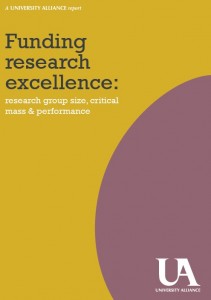 University Alliance today publishes a new report that shows when it comes to research excellence, size doesn’t matter.
University Alliance today publishes a new report that shows when it comes to research excellence, size doesn’t matter.
Funding research excellence, conclusively demonstrates that the Government should not bow to pressure to fund research on the basis of scale; there is no evidence to support the claim that this would produce better research. On the contrary, the evidence points to quality being a driver of scale and not vice versa. The main findings of this research are compelling: that the UK should continue a policy of funding excellence wherever it exists.
The report was commissioned by University Alliance from Evidence Limited (of Thomson Reuters) to examine the relationship between research excellence and volume, or ‘critical mass’, in order to identify how best to invest public money in research. What has emerged is clear evidence that there are many small and medium-sized research units that perform as well as, and often better than, the largest units.
The report also shows why there is no significant correlation between productivity and research unit size. The data provides clear evidence that funding should always follow excellence wherever it is found, as any metric based on scale would not improve quality or productivity.
Libby Hackett, Director of University Alliance said:
“This research gives us the evidence to demonstrate that research funding should continue to follow excellence and there is no justification for re-directing funding to the big departments. We are proud of the world-leading research taking place in University Alliance institutions. Sometimes smaller in scale, these research units have proved their value through the objective, peer-assessed RAE.
“It is clear from the evidence that there are small and medium-sized research units that perform as well as, and often better than, the largest units. It is also clear that growing these units would not necessarily show further improvement in quality or productivity.
“Our institutions carry out world-leading research and will continue to do so. Given the pressures on the sector and public funding more broadly, now is not the time to reduce the return on investment for research. Funding must continue to follow quality or we could see a long-term withering of the UK research base, which would be hugely detrimental to UK PLC.”
Professor Janet Beer, Chair of University Alliance said:
“If funding was to be concentrated on the basis of scale, many units recognised as world-leaders in their research could ultimately miss out on funding. The effect of this would be to stifle the research base and harm the sustainability of the UK research-base, which is respected and renowned across the world.
“The stakes are high. Sustaining and building the UK research base must be core to any strategy for growth in the UK economy. We must also recognise that postgraduate students will be the next generation of researchers and so it is imperative that we build environments that enable them to grow. If we take funding away from some of the highest performing research units across the sector purely because they are small, we risk jeopardising the UK’s future as a world-leader in research and innovation.”
—Ends—
Notes to editor:
- The full report is available from the University Alliance website here.
- The main findings are:
- There is no continuous relationship between research unit size and performance in RAE2008. Among smaller research units there may be a significant positive correlation between size and performance but above a certain threshold no further improvement is evident.
- It is also apparent that there are small and median-sized units which perform as well as, and in some cases better than, the largest units. There is no evidence that funding on the basis of scale would improve overall performance.
- There is no significant correlation between productivity and research unit size. Small and median-sized research units tend to be at least as productive as large units. Also, peak productivity is not generally associated with the largest units, but is often found around the median. This is consistent with a study of US NIH data concluding that “middle sized labs do best” (2010), Wadman).
- From the data it would appear that funding on the basis of scale would not improve overall productivity but might eliminate some of the best units.
- There is also no significant correlation between normalised citation impact and research unit size. Again, small and median-sized units can perform as well as the largest units, and the best performing units are often not the largest.
- Consistent with this data, we propose a model of the relationship between scale and performance. We hypothesise that, rather than scale driving excellence; it is excellence that can enable small units to grow. Small research units can perform well or poorly. Those that perform well may attract additional resources and potentially grow into larger units. Large units that perform poorly are not viable and rapidly lose resources causing them to shrink or cease to exist. If funding was to be concentrated on the basis of scale, small excellent units would be lost. The effect of this would be to stifle the research base. In other words, quality is a driver of scale and not vice-versa.
- There is, for most of the Units of Assessment (UoAs) analysed, little difference in the profiles of the University Alliance institutions, the group of institutions with fewer than the median number of Category A Staff, and the UK as a whole. A similar percentage of the research papers published by each of these groups receive equivalent numbers of citations. Where there are differences in the profiles these can be explained by low volumes of papers being mapped to the relevant UoA, or because of the strategies by which institutions select papers for RAE submissions.
- Because the quality profile of each of the groups of institutions analysed is similar, there is no evidence that removing funding from any particular group would increase overall performance.
- University Alliance institutions contribute a substantial proportion of the UK’s doctoral training capacity in the professional subjects – in some areas over a quarter of the UK’s doctoral training capacity.
About University Alliance
University Alliance is a group of 23 major, business-engaged universities committed to delivering world-class research and a quality student experience around the UK. They are universities without boundaries: delivering economic and social growth through close links with their research, students and staff and the world around them – locally, nationally and internationally. With representation right across the UK they educate over 25% of all UK students, with large proportions of international and post-graduate students.
Alliance universities
Aberystwyth University, Bournemouth University, University of Bradford, De Montfort University, University of Glamorgan, Glasgow Caledonian University, University of Hertfordshire, University of Huddersfield, University of Lincoln, Liverpool John Moores University, Manchester Metropolitan University, Northumbria University, Nottingham Trent University, Open University, Oxford Brookes University, University of Plymouth, University of Portsmouth, University of Salford, Sheffield Hallam University, Teesside University, University of Wales Institute, Cardiff, University of Wales, Newport, University of the West of England.




